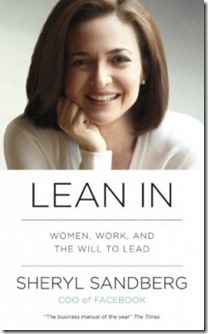Facebook COO’s Hard Sell On The Daily Show
Facebook’s Chief Operating Officer, Sheryl Sandberg, recently appeared on The Daily Show with Jon Stewart to promote her new book, Lean In: Women, Work, And The Will To Lead.
Ms. Sandberg had many terrific communications traits. She made an articulate and persuasive case, used her body language to reinforce her verbal points, and laughed heartily at Mr. Stewart’s jokes.
And yet…
Something about her interview bothered me. I wanted to like her and agreed with every point she made—but I had a difficult time connecting with her. It took me a week and three viewings of her segment to figure out why. (Video is no longer available. Click here to see the clip.)
First, and perhaps most glaringly, she oversold her book. In a six-minute segment, she mentioned Lean In five times (Jon Stewart also mentioned it at the beginning and end of the segment; the name of the book also appeared in a giant on-set graphic, an on-screen book graphic, and a lower third graphic).
In total, viewers saw or heard Lean In no fewer than 10 times in six minutes.
It may surprise you that a media trainer who encourages people to remain on message was chagrined by that. But there’s a fine line between selling and over-selling, between being on message and over-messaged.
Mentioning her book title a couple of times would have been fine. But her continual mentions had the effect of pulling me out of her interview and reminding me that she was there to pitch a product, which compromised my ability to relate with her. Perhaps part of that wasn’t just the repetition—it may have just been that Ms. Sandberg didn’t pull it off without sounding a bit forced.
That leads me to my second point. Sandberg sounded a bit too rehearsed. And that’s a shame, because she did a lot of things right. Her anecdotes were tight and effective (e.g. “Pretty like Mommy” t-shirts, her friend’s five-year-old daughter), and her sound bites were great (e.g. “Men still run the world. And I’m not sure that’s going that well.”)
If I was working with her, I’d advise her to stop trying to deliver her lines as she rehearsed them and to start delivering them like she was talking to an elderly neighbor or a high school friend instead. From her less rehearsed moments in this interview, she appeared to have that ability. She should use it more often. She should be going for “real,” not “polished.”
The bottom line? Ms. Sandberg did a great job with the precision of her words, but didn’t do as well in terms of relating with the audience. (I’ve written more about that common challenge here.) The good news for Sandberg is that she’s really, really close. And with a little more work, she can do a better job of making that all-elusive audience connection.
If Facebook doesn’t shut down my account after writing this story, please stay in touch with me at www.Facebook.com/MrMediaTraining.




I saw this interview, too, and it didn’t work for me either. I agree: she seemed way too rehearsed. To me, that made her unlikeable. And I TRAIN people in how to do this stuff, so that’s saying a lot.
I think she also seemed a little bit over-eager. She reminded me of a puppy dog. So anxious to be loved.
As she’s clearly a compulsive over-achiever, I’d ask her to APPEAR to be relaxed, as if it doesn’t matter whether anyone else likes her. I bet she’s smart enough to be able to do that.
Thanks for your comment, Daphne.
Your point about Ms. Sandberg being an over-achiever is astute (I work with many self-described perfectionists; I’m guessing you do, as well). One thing I always remind perfectionists is that the traits that served them well in other parts of their lives may be the very ones that doom their media interviews.
Simply put, getting the words “perfect” isn’t enough if you fail to connect.
Best,
Brad
What I’m left wondering is that if her book is supposed to open up conversation between women and help women brainstorm together, generate career ideas and increase success (both in and out of the workplace), what better way to sell the book than to have a really great conversation about those topics? I’ve seen several interviews on this tour and she misses on all of them. Don’t sell the book, sell what you have to say in the book. If I’m bored watching your interview, I’ll be bored reading the book and bored in a “Lean In” group.
I think Jon Stewart did several things that made it more difficult for his guest. He appeared to be more focused on being clever and entertaining himself than he did on putting her in the limelight. The star of the segment should have been his guest, not him, but it seemed to me that he spoke much more than half the time, and his questions were of the type–“I think . . . wouldn’t you agree?”
She looked over eager, because she was trying to get in a word edgewise, and he made it difficult with his long, drawn out questions. Shouldn’t a good interviewer ask a simple, concise question and then get out of the way?
What stood out for me as something that did not work were the hand gestures. It’s not that easy to make such dramatic gestures above a table top, when seated. They looked forced and over-practised to me — almost as if she had practised them while standing up and was determined to use the same gestures when seated during the interview